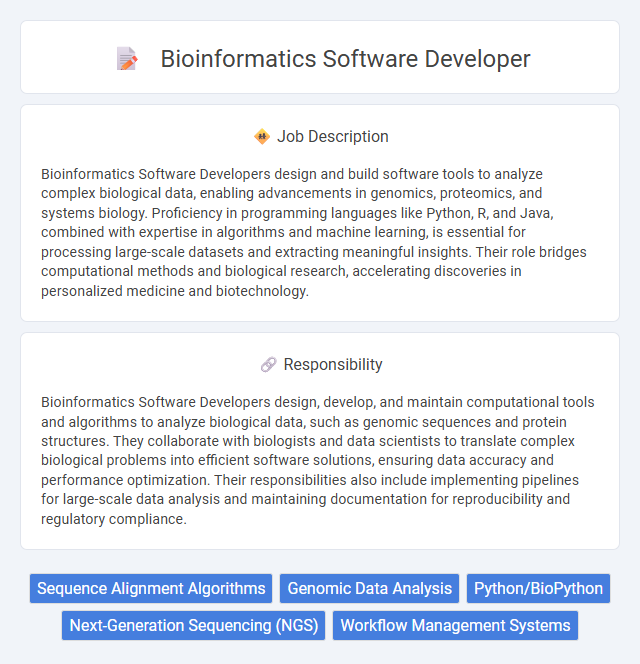
Bioinformatics Software Developers design and build software tools to analyze complex biological data, enabling advancements in genomics, proteomics, and systems biology. Proficiency in programming languages like Python, R, and Java, combined with expertise in algorithms and machine learning, is essential for processing large-scale datasets and extracting meaningful insights. Their role bridges computational methods and biological research, accelerating discoveries in personalized medicine and biotechnology.
Individuals with strong analytical skills and a passion for both biology and computer science are likely suited for a Bioinformatics Software Developer role. Candidates comfortable with programming languages, data analysis, and interdisciplinary collaboration may find the job fulfilling and manageable. Those lacking interest in continuous learning or struggling with complex algorithms might face challenges adapting to the demands of this position.
Qualification
Expertise in computer science, molecular biology, and statistics is essential for a Bioinformatics Software Developer, with proficiency in programming languages such as Python, R, and Java. Experience with bioinformatics tools, algorithms, and data analysis pipelines is critical for interpreting genomic data and developing software applications. A strong foundation in machine learning, database management, and biostatistics enhances capabilities in designing scalable, efficient bioinformatics solutions.
Responsibility
Bioinformatics Software Developers design, develop, and maintain computational tools and algorithms to analyze biological data, such as genomic sequences and protein structures. They collaborate with biologists and data scientists to translate complex biological problems into efficient software solutions, ensuring data accuracy and performance optimization. Their responsibilities also include implementing pipelines for large-scale data analysis and maintaining documentation for reproducibility and regulatory compliance.
Benefit
Bioinformatics software developer positions likely offer significant benefits such as opportunities to work on cutting-edge research projects that combine biology and computer science, fostering innovation and skill development. These roles probably provide competitive salaries and access to advanced computational resources, enhancing both professional growth and productivity. Collaboration with interdisciplinary teams may increase the likelihood of impactful contributions to personalized medicine and genomics.
Challenge
Bioinformatics software developer roles often present challenges related to managing complex biological data and developing algorithms to interpret genomic information accurately. The workload may require adapting to rapidly evolving technologies and integrating cross-disciplinary knowledge from biology, computer science, and statistics. The probability of facing intricate data optimization problems and ensuring software scalability could be high in such positions.
Career Advancement
Bioinformatics software developers leverage expertise in computational biology and programming to design and implement algorithms that analyze complex biological data, driving advancements in genomics and drug discovery. Mastery in languages such as Python, R, and C++, combined with knowledge of data structures and machine learning, enhances opportunities for career growth in biotechnology firms, research institutions, and pharmaceutical companies. Progression paths often include roles like senior developer, bioinformatics scientist, or project manager, with potential to contribute to cutting-edge personalized medicine and synthetic biology projects.
Key Terms
Sequence Alignment Algorithms
A Bioinformatics Software Developer specializing in sequence alignment algorithms designs and implements efficient computational methods to compare DNA, RNA, or protein sequences. Expertise in dynamic programming techniques such as Smith-Waterman and Needleman-Wunsch algorithms is essential for optimizing speed and accuracy in large-scale genomic data analysis. Proficiency in programming languages like Python, C++, and knowledge of machine learning integration enhances the development of scalable bioinformatics tools for high-throughput sequencing projects.
Genomic Data Analysis
Bioinformatics Software Developers specializing in Genomic Data Analysis design and implement algorithms to interpret complex genomic sequences, enabling breakthroughs in personalized medicine and genetic research. Proficiency in programming languages such as Python, R, and Java, coupled with expertise in tools like Hadoop and Apache Spark for big data processing, is essential for managing high-throughput sequencing data. Collaboration with multidisciplinary teams enhances the development of scalable bioinformatics pipelines that accelerate variant discovery and functional annotation.
Python/BioPython
Bioinformatics Software Developers specializing in Python and BioPython design and implement algorithms to analyze complex biological data, such as genomic sequences and protein structures. Proficiency in Python libraries like BioPython enables efficient manipulation and visualization of molecular biology datasets, facilitating insights in genomics, transcriptomics, and proteomics research. Expertise in developing scalable, reproducible pipelines using Python frameworks supports advanced computational biology applications and accelerates discovery in life sciences.
Next-Generation Sequencing (NGS)
A Bioinformatics Software Developer specializing in Next-Generation Sequencing (NGS) is responsible for designing and implementing computational tools to analyze complex genomic data generated by NGS platforms. They utilize programming languages such as Python, R, and C++ to develop algorithms for sequence alignment, variant calling, and data visualization, improving accuracy and efficiency in genomic research. Expertise in bioinformatics pipelines, cloud computing, and data integration techniques enhances the interpretation of large-scale sequencing datasets for applications in personalized medicine and genomics.
Workflow Management Systems
Bioinformatics Software Developers specializing in Workflow Management Systems design and implement automated pipelines that streamline data analysis in genomics, proteomics, and other omics disciplines. Expertise in tools like Nextflow, Snakemake, and Galaxy enables efficient orchestration of complex bioinformatics tasks and reproducible research outcomes. Proficiency in scripting languages such as Python or R supports customization and integration of diverse software components within scalable computational infrastructures.
 kuljobs.com
kuljobs.com